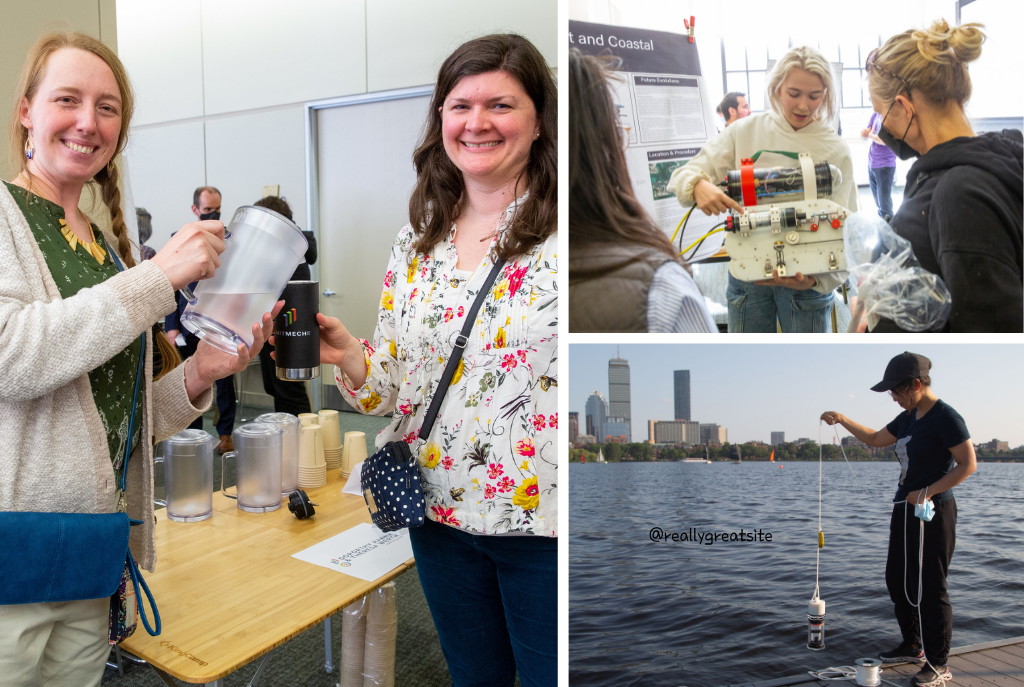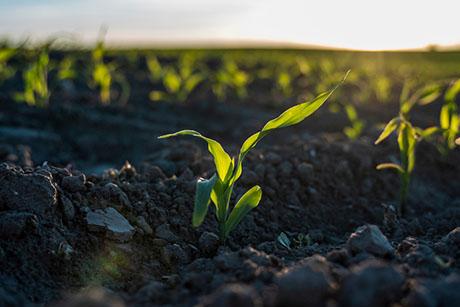A community approach to improving the health of the planet
Earlier this month, MIT’s Department of Mechanical Engineering (MechE) hosted a Health of the Planet Showcase. The event was the culmination of a four-year long community initiative to focus on what the mechanical engineering community at MIT can do to solve some of the biggest challenges the planet faces on a local and global scale. Structured like an informal poster session, the event marked the first time that administrative staff joined students, researchers, and postdocs in sharing their own research.
When Evelyn Wang started her tenure as mechanical engineering department head in July 2018, she and associate department heads Pierre Lermusiaux and Rohit Karnik made the health of the planet a top priority for the department. Their goal was to bring students, faculty, and staff together to develop solutions that address the many problems related to the health of the planet.
“As a field, mechanical engineering is unique in its diversity,” says Wang, the Ford Professor of Engineering. “We have researchers who are world-leading experts on desalination, ocean engineering, energy storage, and photovoltaics, just to name a few. One of our driving motivations has been getting those experts to collaborate and work on new health of the planet research projects together.”
Wang also saw an opportunity to tap into the passions of the department’s students and staff, many of whom devote their extracurricular and personal time to environmental causes. She enlisted the help of a team of faculty and staff to launch what has become known as the MechE Health of the Planet Initiative.
The initiative, which capitalizes on the diverse range of research fields in mechanical engineering, encouraged both grand research ideas that could have impact on a global scale, and smaller personal habits that could help on a smaller scale.
“We wanted to encourage everyone in our community to think about their daily routine and make small changes that really add up over time,” says Dorothy Hanna, program administrator at MIT and one of the staff members leading the initiative.
The Health of the Planet team started small. They hosted an office supply swap day to encourage recycling and reuse of everyday office products. This idea expanded to include the launch of “Lab Reuse Days.” Members of the Rohsenow Kendall Lab, including members of the research groups of professors Gang Chen, John Lienhard, and Evelyn Wang, gathered extra materials for reuse. Researchers from other labs picked up Arduino kits, tubing, and electrical wiring to use for their own projects.
While individuals were encouraged to adopt small habits at home and at work to help the health of the planet, research teams were encouraged to work together on solutions on a larger scale.
Seed funding for collaborative research
In early 2020, the MIT Department of Mechanical Engineering launched a new collaborative seed research program based on funding from MathWorks, the computing software company that developed MATLAB. The first seed funding supported health of the planet research projects led by two or more mechanical engineering faculty members.
“One of the driving goals of MechE has been fostering collaborations and supporting interdisciplinary research on the grand challenges our world faces,” says Pierre Lermusiaux, the Nam P. Suh Professor and associate department head for operations. “The seed funding from MathWorks was a great opportunity to build upon the diverse expertise and creativity our researchers have to address health of the planet related issues.”
The research projects supported by the seed funding ranged from lithium-ion batteries for electric vehicles to high-performance household energy products for low- and middle-income countries. Each project differs in scope and application, and draws upon the expertise of at least two different research groups at MIT.
Throughout the past two years, faculty presented about these research projects in several community seminars. They also participated in a full-day faculty research retreat focused on health of the planet research that included presentations from local Cambridge and Boston city leaders, as well as experts from other MIT departments and Harvard University.
These projects have helped break down barriers and increased collaboration among research groups that focus on different areas. The third round of seed funding for collaborative research projects was recently announced and new projects will be chosen in the coming weeks.
A community showcase
Upon returning to the campus last fall, the Health of the Planet team began planning an event to bring the community together and celebrate the department’s research efforts. The Health of the Planet Showcase, which took place on April 4, featured 26 presenters from across the mechanical engineering community at MIT.
Projects included a marine coastal monitoring robot, solar hydrogen production with thermochemical cycles, and a portable atmospheric water extractor for dry climates. Among the presenters was Administrative Assistant Tony Pulsone, who presented on how honeybees navigate their surroundings, as well as program manager Theresa Werth and program administrator Dorothy Hanna, who presented on reducing bottled water use and practical strategies developed by staff to overcome functional barriers on campus.
The event concluded with the announcement of the Fay and Alfred D. Chandler Jr. Research Fellowship, awarded to a MechE student-led effort to propose a new paradigm to improve the health of our planet. Graduate student Charlene Xia won for her work developing a real-time opto-fluidics system for monitoring the soil microbiome.
“The soil microbiome governs the biogeochemical cycling of macronutrients, micronutrients, and other elements vital for the growth of plants and animal life,” Xia said. “Understanding and predicting the impact of climate change on soil microbiomes and the ecosystem services they provide present a grand challenge and major opportunity.”
The Chandler Fellowship will continue during the 2022-23 academic year, when another student-led project will be chosen. The department also hopes to make the Health of the Planet Showcase an annual gathering.
“The showcase was such a vibrant event,” adds Wang. “It really energized the department and renewed our commitment to growing community efforts and continuing to advance research to help improve and protect the health of our planet.”


